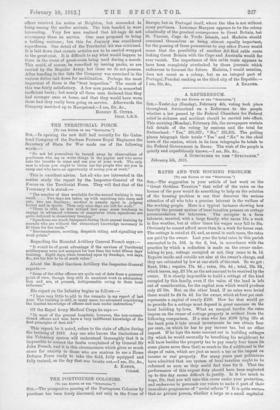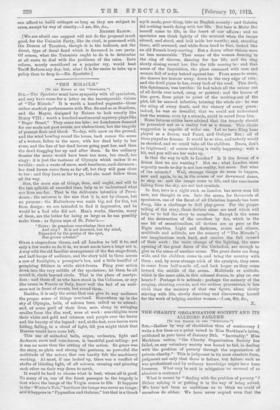RATES AND THE HOUSING PROBLEM.
[TO THE EDITOR OP THE "SPECTATOR,"]
Sin,—The suggestion in your article of last week on the "Great Goddess Taxation" that relief of the rates on the houses of the poor would do something to help on the solution of the housing problem is one that deserves the serious attention of all who take a genuine interest in the welfare of the working people. Here is a typical instance showing how heavily the present system of local taxation presses on cottage accommodation for labourers. The occupier is a farm labourer, married, with a large family, who earns 15s, a week in fine weather, but at other times his wages may fall to 10s. Obviously he cannot afford more than 2s. a, week for house rent. The cottage is rated at 24, and, as usual in such cases, the rates are paid by the owner. Last year the total rates in this parish amounted to 5s. 10d. in the 2, but, in accordance with the practice by which a reduction is made on the owner under- taking to pay, cottage occupied or not, they came to 4s. id. Repairs inside and outside are also at the owner's charge, and they are estimated by law at one-sixth of the rent. So we get : Rent, 104s.; repairs, 17s. 4d. ; rates, 16s. 4d. ; total, 33s. 8d.„ which leaves, say, 23 10s. as the net amount to be received by the owner. It is clearly impossible to build a cottage of the kind occupied by this family, even if the value of the land is left out of consideration, for the capital sum which would produce only es 10s. But, on the other hand, if no rates were levied there would be 24 6s. 4d. for the owner, which at four per cent. represents a capital of nearly 2108. How far that would go to provide for a cottage must depend in great measure on the local building by-laws. What an unequal burden the rates impose on the owner of cottage property is evident from the following comparison. If a man who has 2500 lying idle at the bank puts it into sound investments he can obtain four per cent., on which be has to pay income tax, but no other impost. If he lays the same amount out in building cottages (by which he would. assuredly be benefiting his neighbour) he will have besides the property tax to pay nearly four times (in some places more than that) as much in the 2 additional in the shape of rates, which are just as much a tax as the impost OR income or real property. For many years past politicians have admitted that our system of local taxation ought to be reformed as soon as they could find time for it. That the performance of this urgent duty should have been neglected up to this day seems difficult to justify. Is it too much to hope, Sir, that you will take this cause under your protection, and endeavour to persuade our rulers to make it part of their immediate programme of "social reform"? It is quite certam that no private person, whether a large or a small capitalist
can afford to build cottages so long as they are subject to rates, except by way of charity,—I am, Sir, &C., ERNEST &TOW.
[We are afraid our support will not do the proposal much good, for the Unionist Party, like its rival, is possessed with the Demon of Taxation, though it is the indirect, not the direct, type of fiscal fiend which is favoured in our party. Of course, what the Unionists ought to do is to determine at all costs to deal with the problems of the rates. Rate reform, merely considered as a popular cry, would beat Tariff Reform any day, but, alas! it is far easier to take up a policy than to drop it.—En. Spectator.]











































 Previous page
Previous page